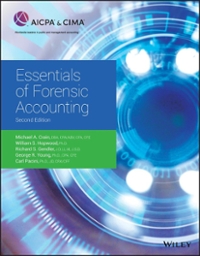Question
1.The following definition pertains to which accounting principle or convention: Transactions and amounts are expressed in terms of a monetary unit. Business entity Objectivity Historical
1.The following definition pertains to which accounting principle or convention: Transactions and amounts are expressed in terms of a monetary unit.
Business entity
Objectivity
Historical cost
Going concern
None of the other alternatives are correct
2.Consider the following statements about a Partnership Agreement:
A. A Partnership Agreement is signed by the managing partner of the partnership on behalf of each of the partners.
B. A Partnership Agreement should not mention profit and loss sharing because upon signing it is unknown whether the partnership will be profitable.
C. The Partnership Agreement should outline the rules of dissolution.
D. Best practice is for a Partnership Agreement to include a financial forecast for at least three years.
Which of the following is true?
A, B, C and D are false.
Only A and C are true.
Only A, C and D are true.
Only C is true.
A, B, C and D are true.
3.The following definition pertains to which accounting principle or convention: an individual accounting unit is separate and distinct from other economic activities and the personal affairs of the owners.
None of the other alternatives are correct
Going concern
Monetary unit
Matching
Materiality
4.The following definition pertains to which desirable attribute of financial statements: statements should be free of material error and/or fraud and represent what really happened or exists.
None of the other alternatives are correct
completeness
subjectivity
reliability
relevance
5.The concept of "materiality" represents which of the following ideas:
An item is "material" if it will cause a large adjustment when converting cash accounting financial statements to accrual accounting financial statements.
If a company informally agrees to rent a premise for their business but has not yet signed a lease, it would not be recorded because it is not "material".
If the owner of a company donates new computers but the company already has computers that it is using in the business, it would not be recorded because it is not "material".
None of the above accurately represents the concept of materiality.
An item is "material" if it will influence the decision-making of an informed financial statement user.
Step by Step Solution
There are 3 Steps involved in it
Step: 1

Get Instant Access to Expert-Tailored Solutions
See step-by-step solutions with expert insights and AI powered tools for academic success
Step: 2

Step: 3

Ace Your Homework with AI
Get the answers you need in no time with our AI-driven, step-by-step assistance
Get Started


